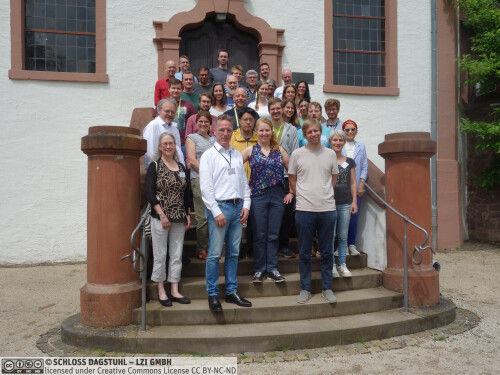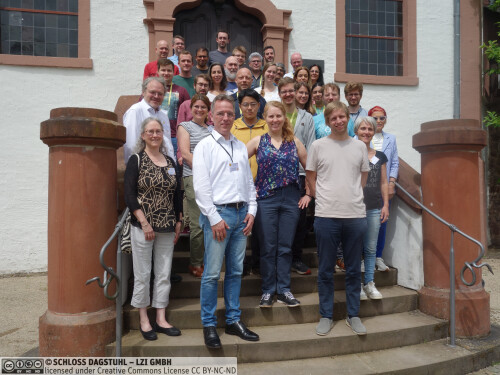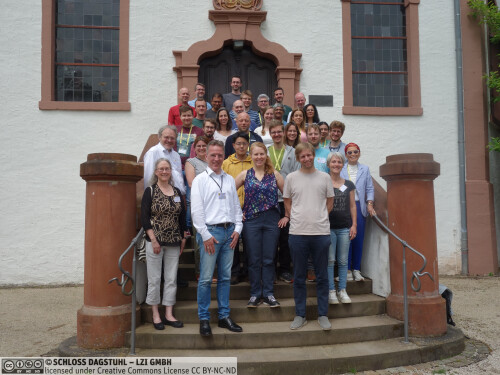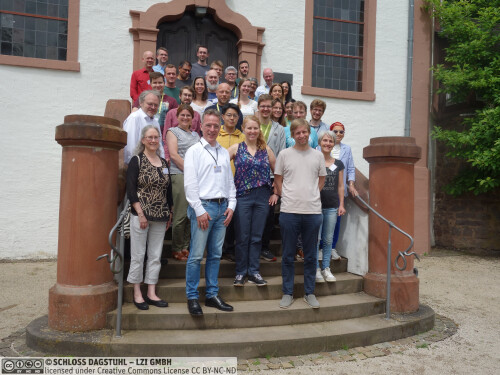Dagstuhl-Seminar 24251
Teaching Support Systems for Formal Foundations of Computer Science
( 16. Jun – 21. Jun, 2024 )
Permalink
Organisatoren
- Tiffany Barnes (North Carolina State University - Raleigh, US)
- Jan Vahrenhold (Universität Münster, DE)
- Thomas Zeume (Ruhr-Universität Bochum, DE)
Kontakt
- Andreas Dolzmann (für wissenschaftliche Fragen)
- Jutka Gasiorowski (für administrative Fragen)
Impacts
- Exploring Error Types in Formal Languages Among Students of Upper Secondary Educationarticle in Koli Calling '24 - Schmellenkamp, Marco; Stanglmair, Dennis; Michaeli, Tilman; Zeume, Thomas - New York : ACM, 2024. - Pages 1 - 8.
- Difficulty Generating Factors for Context-free Language Construction Assignments : article in ICER '25: Proceedings of the 2025 ACM Conference on International Computing Education Research V.1 - Schmalstieg, Florian; Schmellenkamp, Marco; Schwerter, Jakob; Zeume, Thomas - New York : ACM, 2025. - Pages 196 - 209.
- A Survey of Undergraduate Theory of Computing Curricula : article in SIGCSE Virtual 2024 : Proceedings of the 2024 on ACM Virtual Global Computing Education Conference V. 2 - Dougherty, Ryan E.; Liu, Jonathan; Ng, Timothy; Poulsen, Seth; Sandu, Smaranda; Shindler, Michael; Zeume, Thomas; Talmage, Edward; Komm, Dennis; Ferland, Matthew; Erickson, Jeff; Randolph, Tim - New York : ACM, 2025. - Pages 281 - 282.
The primary goal of this Dagstuhl Seminar was to determine how to enable communication between between researchers in computing education, builders of systems for teaching formal foundations, as well as instructors of these foundations. While these groups have very similar interests, they also have very different notions, foci, and methods. In particular, participants from the „formal foundations“ community talk about the „hardness“ of a problem in terms of its computational complexity, participants from the „intelligent tutoring systems“ community are concerned with whether or not a system can scale or how to best provide feedback to the learner, and participants from the „computing education research“ community study the effectiveness of teaching methods for learning, e.g., the cognitive load, student learning, etc.
Within the first one-and-a-half days of the seminar, tutorials on Formal Foundations of CS, CS Education Research, and Intelligent Tutoring Systems given by experts of the respective domains set the stage for the rest of the seminar. The tutorial on CS Education Research was interspersed with breakout sessions for applying the theoretical content of the tutorial to projects of seminar participants, leading to intense discussions across the different communities and therefore being very effective also in bridging barriers between the communities. On the afternoon of the first day, tools and tutoring systems in the formal foundation domain were presented in teaser and poster sessions as well.
The rest of the seminar was centered around breakout sessions, whose research and discussion topics were proposed and voted on by participants. There were a few contributed research talks and occasional ad-hoc tutorial-like sessions as they became relevant for the breakout sessions.
Participants noted that the seminar had a very open atmosphere and that the different research communities were eager to learn from each other. This welcoming spirit was also reflected by a music event on one of the evenings where three of the participants gave a concert and a fare-well magician’s show by one of the participants as part of the closing session.
In summary, it was a very fruitful seminar – both with respect to research collaborations and personal interactions. The goal of bringing together the communities and bridging the gaps between them was fully achieved. Several collaborative research projects were initiated during the seminar and are currently being followed-up on.
 Thomas Zeume, Tiffany Barnes, and Jan Vahrenhold
Thomas Zeume, Tiffany Barnes, and Jan Vahrenhold
Introductory courses on formal foundations of computer science – including basic courses on theoretical computer science (regular and context-free languages, computability theory, and complexity theory) as well as on logic in computer science (propositional and first-order logic, modeling, and algorithms for evaluation and satisfaction of formulas) – are a cornerstone of computer science curricula, yet many students struggle with their often-theoretical contents. The recent influx of students in computer science, as well as the shift towards the inclusion of more online-based teaching, increase the need for advanced teaching support systems that aid both students and instructors.
This Dagstuhl Seminar intends to foster discussion between researchers in computing education, builders of teaching support systems for formal foundations of computer science, as well as instructors of these foundations with the goal of facilitating more robust research and development of such systems.
From the perspective of instructors, teaching support systems should cover contents broadly; provide helpful feedback and instructions for students; enable instructors to assess student progress; and ideally provide empirically established support for achieving the desired learning outcomes. Building such systems therefore requires expertise from both computing education (including teaching support systems and human-computer interaction) and from formal foundations (including instruction and application of formal methods).
Important prerequisites for designing efficient teaching support systems include understanding concepts and misconceptions of the field, how students learn, and how they acquire intended competences. Evaluating such systems is a difficult challenge and analyzing the data provided by (even prototypical) teaching support systems is a good source for fostering our understanding, for instance it can help researchers and educators identify misconceptions.
At the same time, covering broad material of formal foundations is an inherently hard task. For instance, providing even the simplest feedback can be either intractable or infeasible for many topics in formal foundations. Thus, covering theoretical foundations of CS in teaching support systems requires deep knowledge of the methods, and often also creativity to circumvent or solve theoretical challenges.
Combining the expertise of computing education with expertise in formal foundations as well as expertise with system design is thus essential for designing advanced teaching support systems for formal foundations. Towards this aim, our seminar has several specific goals:
- Shaping a community:
- Bring together key members of these different communities, with an eye towards people who are open-minded and receptive to the perspective of the other.
- Create tutorial sessions to educate participants on the existing knowledge, as well as methods, of each side.
- Identifying research challenges:
- Identify data sets which would be helpful in computer science education research and can be delivered by teaching support systems.
- Identify good evaluation scenarios for teaching support systems.
- Identify algorithmic and formal challenges in the design of teaching support systems.
- Networking for sustained impact:
- Establish a regular workshop on teaching support systems in formal foundations which is attractive for both communities.
 Tiffany Barnes, Jan Vahrenhold, and Thomas Zeume
Tiffany Barnes, Jan Vahrenhold, and Thomas Zeume
- Efthimia Aivaloglou (TU Delft, NL) [dblp]
- Erik Barendsen (Radboud University - Nijmegen, NL & Open University - Heerlen, NL) [dblp]
- Tiffany Barnes (North Carolina State University - Raleigh, US) [dblp]
- Rodrigo Duran (Federal Institute of Mato Grosso do Sul, BR) [dblp]
- Felix Freiberger (Universität des Saarlandes - Saarbrücken, DE) [dblp]
- Judith Gal-Ezer (The Open University of Israel - Ra'anana, IL) [dblp]
- Michael Goedicke (Universität Duisburg - Essen, DE) [dblp]
- Michael Hielscher (Pädagogische Hochschule Schwyz, CH) [dblp]
- Norbert Hundeshagen (Universität Kassel, DE) [dblp]
- Johan Jeuring (Utrecht University, NL) [dblp]
- Sandra Kiefer (University of Oxford, GB) [dblp]
- Dennis Komm (ETH Zürich, CH) [dblp]
- Shriram Krishnamurthi (Brown University - Providence, US) [dblp]
- Martin Lange (Universität Kassel, DE) [dblp]
- Alexandra Mendes (University of Porto, PT & INESC TEC - Porto, PT) [dblp]
- Tilman Michaeli (TU München, DE) [dblp]
- Daphne Miedema (University of Amsterdam, NL) [dblp]
- Liat Peterfreund (The Hebrew University of Jerusalem, IL) [dblp]
- Sophie Pinchinat (University of Rennes, FR) [dblp]
- Seth Poulsen (Utah State University, US) [dblp]
- Ramaswamy Ramanujam (Azim Premji University - Bengaluru, IN) [dblp]
- Anne Remke (Universität Münster, DE) [dblp]
- Susan Rodger (Duke University - Durham, US) [dblp]
- Florian Schmalstieg (Ruhr-Universität Bochum, DE)
- Marko Schmellenkamp (Ruhr-Universität Bochum, DE) [dblp]
- Francois Schwarzentruber (IRISA - ENS Rennes, FR) [dblp]
- Thomas Schwentick (TU Dortmund, DE) [dblp]
- Jakob Schwerter (TU Dortmund, DE) [dblp]
- R. Benjamin Shapiro (University of Washington - Seattle, US) [dblp]
- John Slaney (Australian National University - Canberra, AU) [dblp]
- Vaishnavi Sundararajan (Indian Institute of Technology - New Delhi, IN) [dblp]
- Jan Vahrenhold (Universität Münster, DE) [dblp]
- Maximilian Weininger (IST Austria - Klosterneuburg, AT) [dblp]
- Thomas Zeume (Ruhr-Universität Bochum, DE) [dblp]
- Chenhao Zhang (Northwestern University - Evanston, US) [dblp]
Klassifikation
- Formal Languages and Automata Theory
- Human-Computer Interaction
- Logic in Computer Science
Schlagworte
- Computing education research
- Formal foundations of computer science
- Intelligent tutoring systems
- User studies
- user modeling and adaptive personalization
- Artificial intelligence in education
- educational data mining





 Creative Commons BY 4.0
Creative Commons BY 4.0
